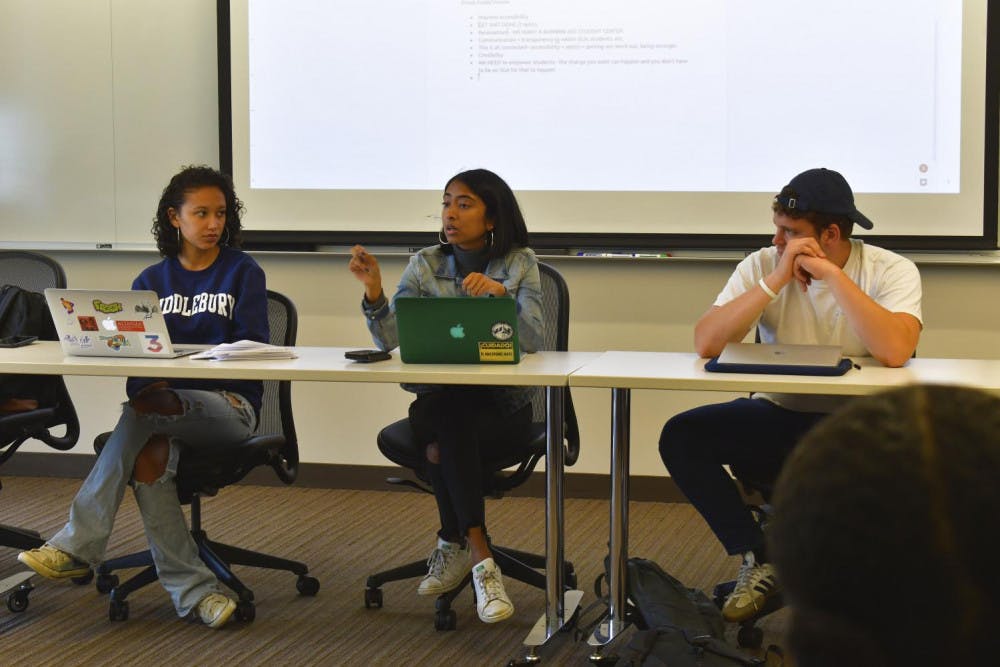Last year’s Student Government Association Senate ended in the spring with threats of dissolution. Now, the new SGA is hoping to move in a different direction.
Seven members of last spring’s senate — current President Varsha Vijayakumar ’20 and all senior senators, junior senators and Feb senators — are still on the SGA this fall. The 10 remaining senators were not in office last spring when the senate created its “13 Proposals for Community Healing,” many of which followed frustrations about slow progress on several issues between students and the administration. The proposals were announced in a school-wide email on Apr. 23 in the wake of the cancellation of a controversial talk from Ryszard Legutko, a far-right Polish politician, and were written with input gathered from the wider student body at a town hall a week later.
After the administration’s initial response to several of the proposals — which included a tentative commitment to add a student delegate to the Board of Trustees and increase student representation in the administration’s Senior Leadership Group — the Senate decided not to dissolve in their last meeting of the semester.
Status update
Several of the 13 Proposals have been completed as written in the original statement, including the second proposal, which called for a student, staff member and faculty member to each be appointed as representatives to the College Board of Overseers. The College Board of Overseers is one of three committees within the Board of Trustees; there is also a board for the Middlebury Institute of International Studies and one for the Language Schools, Schools Abroad and Bread Loaf School of English.
Vijayakumar, Associate Vice President for Advancement Operations Jami Black and History Professor William Hart were elected by the student body, Staff Council and Faculty Council, respectively, to serve as the three representatives to the board. Each representative will report back to their constituents following board meetings.
Saif Panday ’21 joined Wengel Kifle ’20 as a student representative on the Community Bias Response Team (CBRT), addressing the ninth proposal’s call for more student representation on the team.
Addressing the second half of that same proposal, which demanded more direct communication after the cancellation of campus events, Chief Diversity Officer Miguel Fernández explained that the request does not fall under the job description of his office.
“Cancellation of campus events is not a bias incident and thus does not fall under the purview of CBRT, so we will not be sending out such communications,” he said.
The college is offering a Black Studies major for the first time this fall, which was called for in the 13th proposal and has been in the works for several years. The major, led by History Professor Bill Hart and American Studies Professor J. Finley, came as a combined result of academic planning by faculty and administration, as well as renewed student campaigns in support of the program.
Several other efforts related to the proposals are in the works. Fernández said President Laurie Patton has plans to appoint an ad hoc working group in the next few weeks to look into an LGBTQ+ center, which was the 10th proposal.
“Movement on this center was stimulated by a student desire for programming, support, and mentoring for queer and trans students on campus,” he said. “I would say it was student-driven.”
Elisa Gan ’20 was nominated to be the the Student Liaison to the SGA on Endowment Affairs (SLSEA). This came after a weeks-long nomination process, in which Gan was approved by the Senate during its meeting on Sunday, Sept. 22. Gan will be a non-voting member of the Investment Committee of the Board of Trustees, has full access to information about the endowment, and will report back to the SGA on how the school’s endowment is being invested.
The Senior Leadership Group (SLG) will be creating student advisory committees for each administrator in the group in response to the first proposal. This move will help bring in more student perspective to the work of the administration, and help improve cooperation between students and administrators.
The third proposal, which asked the Office of Institutional Diversity, Equity and Inclusion (OIDEI) to create a due diligence form for speaker invitations, is no longer on the table and was deemed unworkable, according to Fernández.
“It is not OIDEI’s place to vet speakers. My office was not consulted ahead of time and we do not foresee taking on this role,” Fernandez said.
Fernández said that the fifth proposal, which proposed bias training for all hired staff, faculty, administrators and students, will be covered by Renee Wells’ Inclusive Practitioners program.
Parton Health Center is currently conducting a search for a counselor with expertise working with marginalized communities, which was the 12th proposal.
Administrators did not respond to comment on the progress of several other proposals. These include the proposals centered around communication from the administration about ongoing proposal progress, revisiting the protest policy, improvements to the Green Dot program, making all buildings ADA accessible and making all organizational expenditures available on the college website (the fourth, sixth, seventh, eighth, and 11th proposals, respectively).
A spokesperson from student government said some of the above proposals are in the works.
A change in tone
Vijayakumar, who was serving as a junior senator last spring when the proposals were issued, has decided not to focus her presidency on their completion.
“Frustration about the lack of student voice included in decision-making processes that will significantly impact our campus culture and student life was, is and should be warranted,” Vijayakumar said. “That being said, this new SGA has worked hard to lay the groundwork for a significant shift in approach that will focus on earning student support and attacking problems on our campus through a more analytical and pragmatic lens.”
This new approach has been welcomed by administrators, some of whom felt the way last year’s SGA presented the proposals was unreasonable.
“The administration did not sign off on the 13 Proposals,” Fernandez said. “This administration believes in dialogue and does not take well to demands. And let’s be honest, these proposals were demands.”
As Vijayakumar worked over the summer to construct a new approach to achieve the SGA’s goals, this was very present in her mind as she built her cabinet, set initiatives and planned for the year to come.
Her approach has been apparent in the first several meetings this year, and she has emphasized the importance of cooperation, accountability and responsibility amongst the entire body. Vijayakumar and her chief of staff, Drew Platt ’20.5, have stressed in recent meetings that representatives need to hold themselves accountable to their own personal initiatives and to the overall goals of the SGA.
“In the past few years many individual members within SGA have done a lot of good work, but the body as a whole has suffered from lack of collaboration and consistency,” Vijayakumar said. “We spent a lot of time this summer diagnosing these issues and developing an action plan to ensure that SGA members will be held accountable within our body, and more importantly to the student body as well.”
For example, the senate was unable to vote on the full proposed list of committee members of every SGA Cabinet Committee during the senate meeting on Sept. 30 after several committee chairs failed to submit their proposed lists on time. The SGA Cabinet consists of dozens of committees that touch every aspect of student life, from athletics to sexual respect.
Vijayakumar called out these unnamed cabinet committee chairs who “didn’t pull their weight” and caused the delay to the approval process. After Vijayakumar set a new deadline, the senate voted Monday to approve the lists of committee members.
The heightened focus of the cabinet, which had taken a backseat in previous administrations, has led to greater responsibility, support, and accountability for appointed cabinet directors from Vijayakumar and her executive team.
Vijayakumar said she and her staff are holding cabinet leaders to a higher standard.
“We have implemented several new accountability measures to ensure that these cabinet committees are more effective than they have been in the past,” Vijayakumar said. “As a result we are confident that the initiatives inspired by the proposals are in the hands of the people that are most dedicated to making tangible progress on those issues.”
Vijayakumar has also sought to improve the underlying issue that drove the 13 Proposals, namely a lack of cooperation between students and the administration. She hopes to improve that relationship to make her SGA as productive as possible.
“Students should also expect a new level of collaboration with the administration,” Vijayakumar said. “They have proven themselves to be more open to student input than ever before, and we are excited to work together in efforts to make this campus a better place for students to study and live.”
For an example, she pointed to an event led by Fernández that will bring more clarity to the faculty hiring process and how that translates to hiring a more diverse faculty. The event, which will take place on Oct. 16, was organized by members of the Cabinet together with Fernández and the OIDEI.
“The fireworks that we saw towards the end of last year represented justified emotions but ultimately did not serve as a means to build consensus or lasting change,” Vijayakumar said. “We have been very conscious of that as we set out our plans to shift SGA culture this year.”
Correction: A previous version of this article misstated the number of returning senators.

Porter Bowman ’21.5 is the Senior Opinions Editor.
He previously served as the Correspondent to the Student Government Association (SGA) and a Staff Writer for the News and Local sections.
Bowman is pursuing an International Politics and Economics major and a History minor.
During the summer of 2020, Bowman started a podcast called “Why Not U.S.?” where he interviewed young people in their 20s serving in political office across the country.
He also worked as a producer and researcher for “Trickeration,” an investigative sports podcast from iHeartMedia hosted by Campus alum Matt Waxman ’01.5.
When not watching the West Wing or finishing crossword puzzles, Bowman plays on the Middlebury varsity golf team alongside basketball, club tennis, and intramural volleyball.
He lost on Teen Jeopardy! in November 2016.




